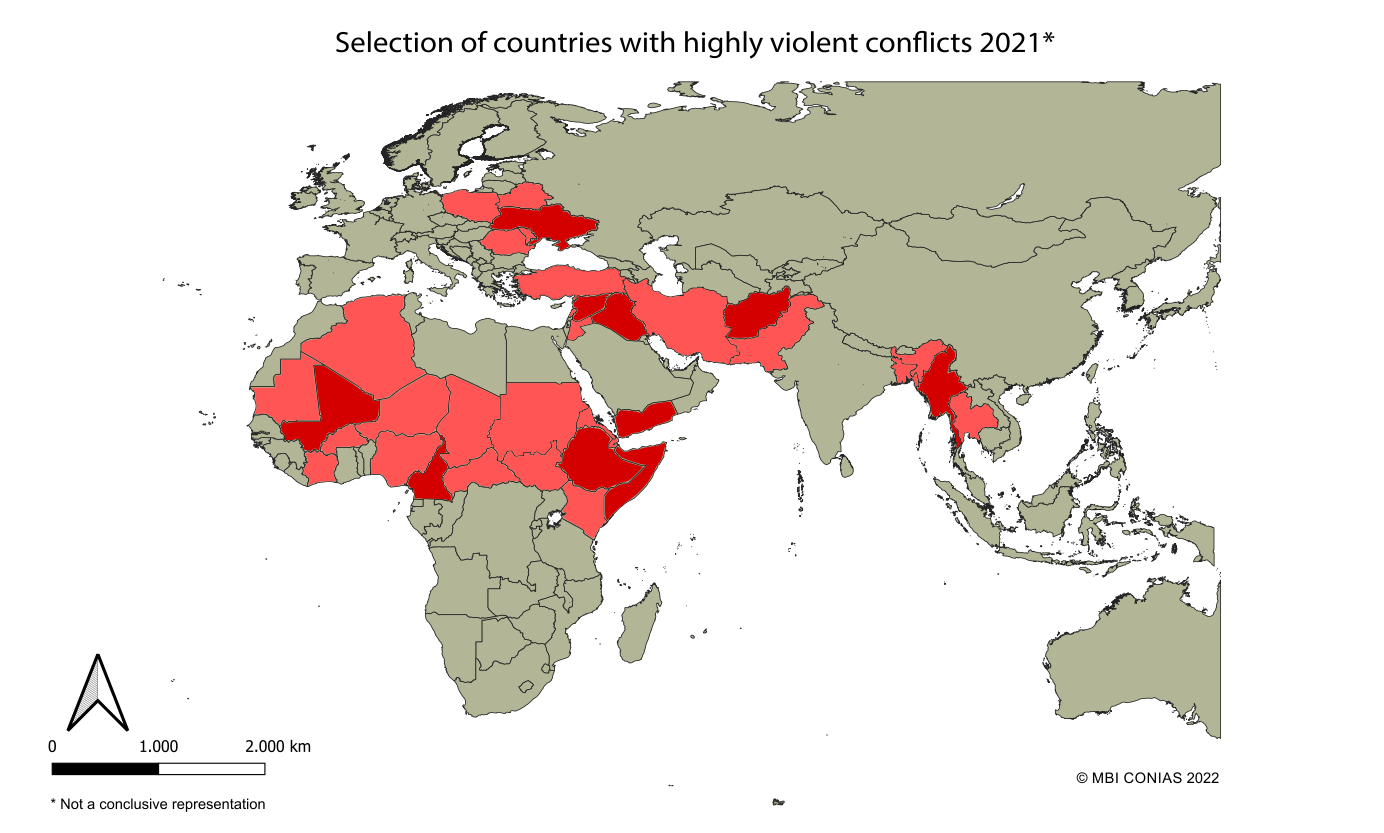
Were you surprised by the outbreak of the crisis in Ukraine? You are not alone in this – because in times of Corona and climate change, there is very little coverage of foreign crises in the mainstream media. And it is precisely this everyday, private media reporting that small and medium-sized enterprises and their decision-makers predominantly use to obtain information about international crises. But in fact, since 2014, a war has been waged in Ukraine, but mostly in the absence of the international press, and has probably cost the lives of 1,000 people every year. An ongoing war in a country is a significant risk factor, but this one was forgotten and its potential was only included in very few risk assessments.
Closing blind spots in geopolitical know-how
In this context, Ukraine is unfortunately not an isolated case. Last year, MBI CONIAS observed a total of almost 90 wars and war-like conditions, as well as more than 500 other violent conflicts below the threshold of war worldwide. In addition, there were approximately 300 conflicts that were non-violent last year, but in which there were threats of violence. The number of wars and crises makes it clear that those who continue to limit themselves to the daily news and the usual media outlets can very quickly develop “blind spots” in their own geopolitical knowledge – with devastating consequences for investment and SCM decisions. To remedy this, the trainings and products from MBI CONIAS Risk Intelligence can be used.
Global situation assessments through scientifically based data collection, coding and evaluation
Our data products are based on globally collected, balanced and comprehensive data sets from a wide variety of sources. The scientific approach of MBI CONIAS makes it possible to compare and evaluate the most diverse conflict situations. In this way, current situation assessments can be provided quickly and effectively for all regions worldwide, regardless of current events in other parts of the world. Against this background, it was possible to identify many crises for 2021 that showed a dynamic conflict situation with a high intensity, but hardly played a role in the leading media. In 2021 alone, the MBI CONIAS experts coded almost 90 conflicts in 34 countries in the two highest intensity levels. These include so-called “failed states” such as Syria and Somalia, but also Myanmar, Turkey, Iraq and Cameroon. Some of the conflicts taking place here have a massive impact on the stability of neighboring countries and thus also on the supply chains of German and European producers as well as on transport routes.
Conflict monitoring of supposedly minor conflicts as a distinguishing feature
In Myanmar alone, seven other high-intensity conflicts are currently active in addition to the military coup. These are often armed conflicts in the country's border regions, which can also affect neighboring countries. Such high-intensity conflicts with intra-state implications typically offer potential to destabilize the entire region. In Turkey, the conflict with the Kurdish minority is not only smoldering, it is active and deadly. Well over 500 people died in the context of the conflict last year, and not just in Iraq. The question of an independent Kurdistan is a red flag for Ankara, but quite conceivable for its NATO partner, the United States. The global political implications of supposedly minor conflicts become apparent here. It becomes clear that comprehensive and effective conflict monitoring can make all the difference.
Inclusion of interconnectivity is essential for comprehensive assessment of the security situation
Furthermore, interstate conflicts such as the one between Israel and Iran have by no means cooled down in the past year. On the contrary, the threat level in the Middle and Near East remains high. Overall, interconnectivity should never be underestimated in conflicts that appear isolated. As an example, Israel's overflight rights for Syrian airspace are of important significance in the fight against Iranian influence in the region, but can be interdicted by Russia at any time. In this context, for example, the Israeli prime minister's current attempt to mediate in the Ukraine war can be reassessed. In the same way, the development of armed conflicts in sub-Saharan Africa is of important significance when it comes to Russia's role on the continent. It is clear that a comprehensive picture of the security situation is indispensable for making sustainable business decisions. A well-informed decision can be the decisive factor for long-term success in a region.
Another example of a highly explosive conflict in 2021, which was hardly mentioned in public, is that in the Tigray region in Ethiopia. We will be diving into this in our blog series on forgotten conflicts next week.
Political conflicts and the associated political risks are becoming an increasingly important factor for a functioning supply chain. In our seminars at the MBI CONIAS Academy, we train you to become a “Political Risk Manager” in cooperation with Funk, the largest German insurance broker. Register today to receiver further information.
About the authors:
Dr. Nicolas Schwank & Leon Seydel
CONIAS Risk Intelligence
Michael Bauer International GmbH


